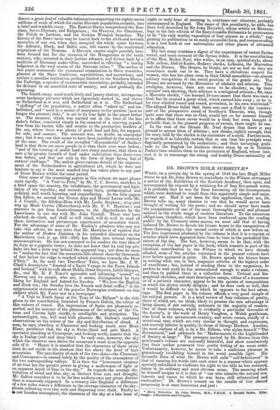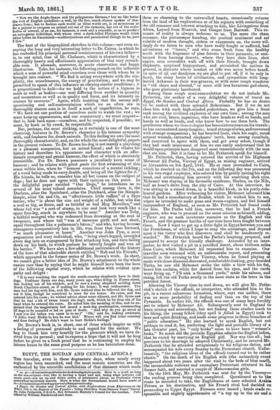DR. BROWN'S HORS SUBSECIVB.*
WHEN, on a certain day in the spring of 1816 the late Hugh Miller wrote to ask Dr. John Brown to contribute to the Witness newspaper a notice of the Exhibition of the Scottish Academy, then open, and accompanied his request by a retaining fee of four five-pound notes, it is probable that he was far from foreseeing all the consequences which were destined to result from this apparently simple and unim- portant act. Had it not been for this application, there are' Dr. Brown tells us, many chances to one that he would never have thought of writing for the press; and we should never have made the acquaintance of one of the most thoroughly genial and pleasant authors in the whole range of modern literature. To the numerous obligations, therefore, which have been conferred upon the reading public by the Cromarty stone-mason, we must add that of having induced Dr. Brown to devote his leisure hours to the composition of those charming essays, the second series of which is now before us. The first impression produced by the volume is that it is a reprint of articles which have appeared from time to time in the periodical lite- rature of the day. The fact, however, seems to be that, with the exception of the last paper in the book, which consists in part of the identical contribution to the Witness to which we have already alluded, none of the articles contained in the present volume have ever before appeared in print. Dr. Brown spends his leisure hours in writing what are, in fact, magazine articles of the highest order of excellence ; but, instead of sending them to the magazines, he prefers to wait until he has accumulated enough to make a volume, and then to publish them in a collective form. Critical and bio- graphical sketches, and short descriptive essays, either of a humorous or of a pathetic character, appear to be the species of compositions in which the doctor chiefly delights ; and he does each so well, that it would be difficult to say in which he appears to the best advan- tage. The first paper in the volume affords a very good sample of his critical powers. It is a brief review of four volumes of poetry, three of which are, we think, likely to possess the rare advantage of being almost, if not entirely, unknown to. the majority of readers. One of these volumes, which is evidently a particular favourite of the doctor's, is the work of Henry Vaughan, a Welsh gentleman, who lived in the seventeenth century, and wrote verses, chiefly of a uevotional cast, which are very similar in thought and expression, and scarcely inferior in quality, to those of George Herbert. Another, the most curious of all, is by a Mr. Ellison, who styles himself "The Bornnatural," and addresses his " Madmoments to the Lightheaded of Society at large." The passages quoted by Dr. Brown from this gentleman's volume are unusually beautiful, and show conclusively that their author possessed true poetic feeling of no mean order. Unfortunately, however, he seems to take a malicious pleasure in gratuitously exhibiting himself in the worst possible light. His favourite form of what Dr. Brown well calls self-befoolment" is that of running his words into each other in a manner which appears specially calculated to vindicate his right to the title he has assumed, taken in its ordinary and most obvious sense. The meaning which he himself assigns to it is that of "one who inherits the natural sen- timents and tastes to which he was born, still artunsullied and customfree." Dr. Brown's remark on the results of this absurd propensity is at once humorous and just : Home Subsecior. By John Brown, M.D., F.E.S.E. A Second Series. Edin- burgh: Edmonston and Douglas. "Now we like Anglo-Saxon and the polygamous German,* but we like better the well of English undefiled—a well, by the bye, much of tener spoken of than drawn from ; but to fashion such words as these words are, is as monstrous as for a painter to compose an animal not out of the elements, but out of the entire bodies of several, of an ass, for instance, a cock and a crocodile, so as to produce an outrageous individual, with whom even a duck-billed Platypus would think twice before he fraternized—ornithorynchous and paradoxical though he be, poor f Bow."
The best of the biographical sketches in this volume—not even ex- cepting the long and very Interesting letter to Dr. Cairns, in which he has embodied his principal personal reminiscences of his own father— is, to our mind, that of Dr. Chalmers, which is characterized by a thoroughly hearty and affectionate appreciation of that very remark- able man. It abounds, moreover, n acute observation and happy illustration. Take, for instance, the following remark on the influence which a man of powerful mind exercises over those with whom he is brought into contact. "We find it acting everywhere with the sim- plicity, the ceaselessness, the energy of gravitation; and we may be permitted to speak of this influence as obeying similar conditions; it is proportioned to bulk—for we hold to the notion of a bigness in souls as well as bodies—one soul differing from another in quantity and momentum as well as in quality and force, and its intensity in- creases by nearness." Again, while insisting that the uneasy self- questioning and self-contemplation which we so often see in thoroughly sincere men is in itself a mark of imperfection, he says, "We have set one portion of ourselves aside to watch the rest; we must keep up appearances, and our consistency ; we must respect— that is, look back upon—ourselves, and be respected, if possible; we must, by hook or by crook, be respectable."
But, perhaps, the most striking, as it certainly is one of the most charming, features in Dr. Brown's character is his intense sympathy with, and fondness for, dumb animals. To this feeling we owe the most thoroughly characteristic, and, on the whole the most delightful, papers in the present volume. To Dr. Brown his dog is not merely a plaything or a pleasant companion, but an actual friend; and he relates his history and describes his appearance and character with an affec- tionate sympathy and genial humour, the effect of which is absolutely irresistible. For Dr. Brown possesses a peculiarly keen sense of humour; and he relates with great gusto the first awakening of this sense within him, when he "became conscious of a mental tickling; of a word being made to carry double, and being all the lighter for it." His friends, he tells us, consider him all but insane on the subject of dogs ; but he does not agree with their opinion on this point. In the delightful paper entitled "Our Dogs," he introduces us to several of his most valued associates. Chief among them is, the Duchess, alias the Sputchard, alias the Dutchard, alias the Ricapic- ticapic, alias Oz and Oz, an "affectionate little ruffian" of a Skye terrier, who "is about the size and weight of a rabbit, but who has a soul as big, as fierce, and as faithful as had Meg Merrilies," and whose tail was "a sort of stump, in size and look very much like a spare fore-leg, stuck in anywhere to be near." Another was Toby, a faithful mongrel who was redeemed from drowning at the cost of twopence, and whose tail "was of immense girth and not short, equal throughout like a policeman's baton ;" and who, having become courageous comparatively late in life, was, from that time forward, "so much pleasanter at home." Another was John Pym, a most pugnacious and wary individual, who, "being short-legged, inveigled every dog into an engagement by first attacking him, and then falling down on his back, in which posture he latterly fought and won all his battles." We have also a few additional particulars of the history of the hero of that admirable sketch entitled "Bab and his Friends,' which appeared in the former series of Dr. Brown's work. In short, we cannot give a better idea of Dr. Brown's attachment to the whole canine race than by saying that he might himself have been the hero of the following capital story, which he relates with evident sym- pathy and delight : "it is very touching the regard the south-country shepherds have to their dogs. Professor Syme one day, many years ago, when living in Forres-street, was looking out of his window, and he saw a young shepherd striding down North Charlotte-street, as if making for his house: it was midsummer. The man had his dog with him, and Mr. Syme noticed that he followed the dog, and -110t it him, though he contrived to steer for the house. He came, and was ushered into his room; he wished advice about some ailment, and Mr. Syme saw that he had a bit of twine round the dog's neck, which he let drop out of his hand when he entered the room. He asked him the meaning of this, and he ex- plained that the magistrates had issued a mad-dog proclamation, commanding all dogs to be muzzled or led on pain of death. And why do you go about as I saw you did before you came in to me?" Oh,' said he, looking awkward, 41 didna want Birkie to ken he was tied.' Where will yon find truer courtesy and finer feeling? He didn't want to hurt Birkie's feelings."
Dr. Brown's book is, in short, one of those which inspire us with a feeling of personal gratitude to and regard for the author. We beg to thank him very heartily for the pleasure which we have de- rived from its perusal; and to express a hope that it will not be long before he gives us a fresh proof that he is continuing to employ his leisure hours to the same good purpose as he has heretofore done.































 Previous page
Previous page